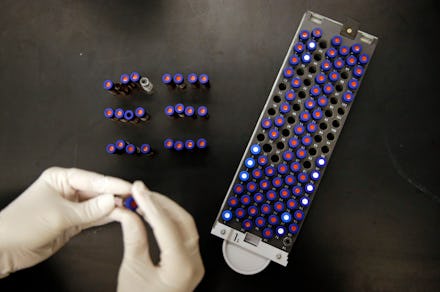Trump administration appeals to abortion rights opponents by canceling fetal tissue contract

The Trump administration is taking action against federally funded fetal tissue research, an effective scientific practice decried by anti-abortion-rights advocates.
In a statement released Monday, the U.S. Department of Health and Human Services announced it was terminating a Food and Drug Administration contract with Advanced Bioscience Resources Inc. The $15,900 contract, which was awarded in July, allowed the FDA to acquire “fresh human fetal tissue” for “ongoing research.”
The agency said it was conducting a review of all fetal tissue research to “ensure the adequacy of procedures and oversight of this research in light of the serious regulatory, moral and ethical considerations involved” and would review all of its contracts for obtaining fetal tissue. HHS also said it was taking steps to ensure the development of alternatives to fetal tissue research is “funded and accelerated.”
Fetal tissue research is medical research performed using human fetal tissue obtained through abortions at or after nine weeks of pregnancy. The cells forming fetal tissue have unique properties compared to adult tissue samples — they’re more flexible, more adaptable to new environments and are easier to grow, according to Stat.
Research using fetal tissue has been used to understand the effect of viruses on fetal development, to illustrate how human tissues are affected by disease and to develop vaccines for polio, measles, mumps, rubella, chickenpox, whooping cough, tetanus, hepatitis A and rabies. HIV, Ebola, the Zika virus, hepatitis B and C, Down syndrome and autism are among the conditions currently being helped by fetal tissue research.
Fetal tissue has also been used for transplants to help lessen or cure the effects of such diseases as diabetes, Parkinson’s, ALS and other neurological disorders.
“From therapies for end-stage breast cancer, diabetes and Parkinson’s disease to a promising vaccine for Ebola, vital medical research depends on continued use of fetal tissue under current laws and regulations,” the Association of American Colleges wrote in a 2016 letter to Congress.
Though fetal tissue research has taken place since the 1930s, the practice has become more politicized since abortion was legalized nationwide in 1973 with Roe v. Wade. Opponents of abortion rights reportedly believe the practice encourages more women to get abortions and could result in a “fetal harvesting industry.”
More recently, the research has been under renewed scrutiny since anti-abortion-rights activists from the Center for Medical Progress released heavily edited and misleading videos in 2015 that purportedly showed Planned Parenthood representatives discussing making a profit from the sale of fetal tissue. The activists, who have since been charged with invasion of privacy, posed as representatives from Advanced Bioscience Resources.
Current U.S. law regarding fetal tissue research stipulates that “no inducements, monetary or otherwise, will be offered to terminate a pregnancy” and forbids anyone from profiting off fetal tissue beyond the reimbursement of basic costs. The American Medical Association also has a code of ethics that governs the use of fetal tissue, including obtaining a woman’s voluntary consent before her fetal tissue is used for research and ensuring a decision to terminate a pregnancy is made prior to and independent of any decision to use the fetal tissue for research purposes.
The Trump administration’s announcement Monday came amid heightened scrutiny over the FDA’s contract with Advanced Bioscience Resources by Republicans and opponents of abortion rights. The Center for Medical Progress condemned the FDA contract as “unconscionable” in an August statement, and 45 leaders of anti-abortion-rights organizations sent a letter to HHS Secretary Alex Azar calling on the federal government to “end all association with those who participate in any trafficking or procurement of aborted baby organs.”
Eighty-five Republican members of the U.S. House of Representatives sent their own letter to FDA Commissioner Scott Gottlieb on Sept. 17 expressing “deep concern” about the contract.
“Unborn children are not commodities to be bought and sold,” the lawmakers wrote. “The practice of conducting research using the body parts of children whose lives have been violently ended by abortion is abhorrent.”
Though the Trump administration has now canceled the Advanced Bioscience Resources contract, anti-abortion-rights activists are still saying the White House isn’t going far enough to address federal funding of fetal tissue research. According to data from the National Institutes of Health, the NIH spent $98 million on fetal tissue research in 2017 and is projected to spend $103 million in 2018.
Anti-abortion-rights group the Susan B. Anthony List called the contract termination “a small step forward, but overall ... completely inadequate”; the Center for Medical Progress similarly described the move as a “small first step” and said it would file a Freedom of Information Act request concerning the federal government’s fetal tissue funding.
“Pro-life Americans are horrified and outraged by revelations that the pro-life Trump administration contracted with a notorious baby parts trafficker to purchase ‘fresh’ aborted baby body parts for research at taxpayer expense,” SBA List president Marjorie Dannenfelser said in a statement. “Unfortunately, HHS’s response does very little to alleviate the outrage. Secretary Azar must show decisive leadership and fix this problem immediately.”